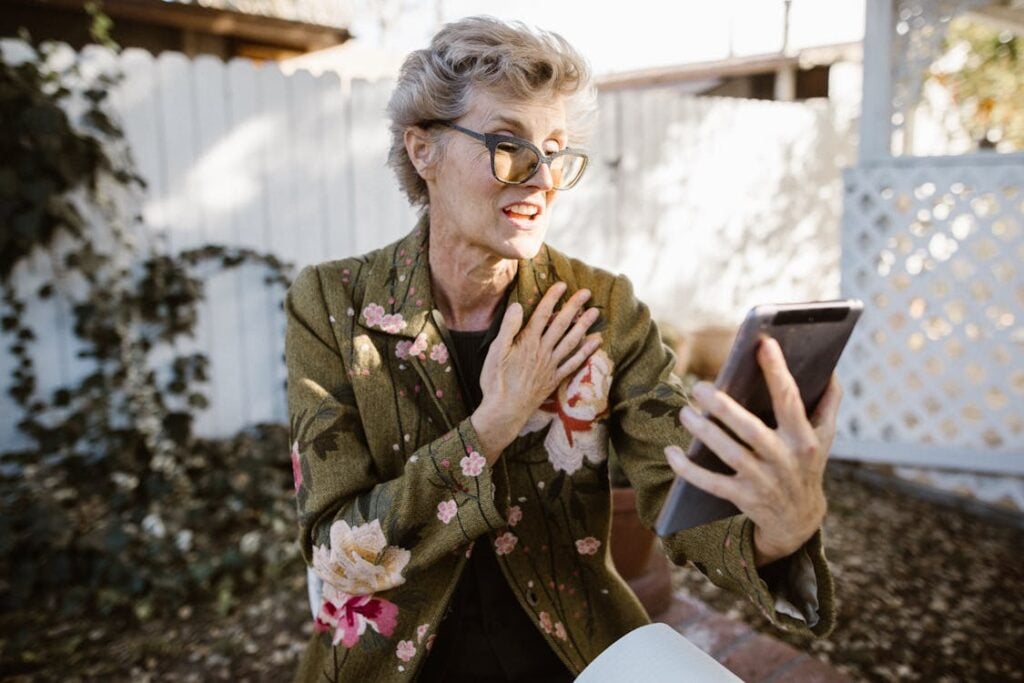 Image Credit: DepositPhotos
Image Credit: DepositPhotos
The generational divide between Baby Boomers and younger generations, like Millennials and Gen Z, is often more than just a topic for discussion, it’s a source of frustration. Younger people, accustomed to fast-paced, tech-driven lifestyles, often find themselves at odds with certain
Boomer habits that feel outdated or intrusive. According to Pew Research, 93% of Millennials own smartphones, compared to only 68% of Baby Boomers, making it clear why there are gaps in ideologies between Baby Boomers and Millennials.
One of the biggest areas of contention is the difference in communication styles. While Boomers prefer the personal touch of phone calls, younger people see texting as a more efficient way to stay connected.
These differences, while seemingly small, create friction and can make everyday interactions more stressful. If these generational gaps aren’t acknowledged, they can lead to misunderstandings and, ultimately, disconnect between the two groups.
In this article, we’ll look into some of the most frustrating Baby Boomer habits that younger generations simply can’t stand. Can you relate to any of these?
Overemphasizing Phone Calls Over Texts

 Image Credit: Pexels
Image Credit: Pexels
For Baby Boomers, phone calls often signify a more personal and sincere way to connect. They see it as a thoughtful gesture, but younger generations, who juggle multiple responsibilities, view it as a time-consuming approach.
Millennials and Gen Z value quick and efficient communication, where a text gets the message across without disrupting their day. The insistence on calls for minor issues can feel intrusive and frustrating.
🙋♀️Join AARP through this link and pay just $12 for your first year with automatic renewal and choose your FREE Gift.💪
Obsession with Homeownership


Homeownership was a defining achievement for many Baby Boomers, symbolizing financial stability and success. But Millennials and Gen Z face a different economic reality, with high student debt and skyrocketing housing costs making it harder to afford a home.
Many younger people are opting for renting or choosing minimalist lifestyles, leading to clashes with Boomers who may not understand why homeownership isn’t a top priority anymore. This generational divide can feel like a judgment on their choices.
Our Daily All Purpose Cleaner


Passive Real Estate Investing – How To Get Started
Not Understanding Mental Health Issues


Mental health is much more openly discussed and prioritized by younger generations. Terms like anxiety, depression, and burnout are part of everyday conversations for Millennials and Gen Z, who expect empathy and support.
Baby Boomers, on the other hand, often carry the mentality of “toughing it out” or “pulling yourself up by your bootstraps,” which can come off as dismissive of these legitimate struggles. This disconnect can lead to frustration and feelings of being misunderstood.
Boomers Were Right! 20 Times They Showed Us They Knew Best
Dismissing Remote Work


With remote work becoming a norm, especially after the pandemic, many younger people see it as a more balanced and productive way to work. Though Baby Boomers, who built their careers in traditional office environments, may view working from home as less efficient or even lazy.
The skepticism around remote work is particularly frustrating for younger generations, who value the flexibility it offers and believe it leads to a better work-life balance. This resistance to change creates tension in workplace dynamics.
Boomers Built These 28 Work Traditions, Now Millennials and Gen Z Are Rejecting Them


Reluctance to Embrace Technology


Technology is second nature to Millennials and Gen Z, but for many Baby Boomers, adapting to new gadgets and apps can feel overwhelming. Younger people are used to quick, efficient tech solutions.
And when Boomers struggle with something as simple as sending an email or using a smartphone app, it can create frustration. The situation worsens when Boomers dismiss new technology as unnecessary or overly complicated, further highlighting the generational divide.
22 Uncomfortable Truths: How Technology Is Quietly Making Life Worse
Using Speakerphone in Public

 Image Credit: Pexels
Image Credit: Pexels
Baby Boomers often have a habit of using speakerphone in public, even when they’re walking through a store or sitting in a café. While they may see it as a convenient way to communicate, younger generations find it intrusive and inconsiderate.
The loud conversations disrupt the space and make others feel like they’re forced to listen in on private discussions. For Millennials and Gen Z, who prefer to use headphones or keep their phone conversations discreet, this habit can be a major source of frustration.
21 Things Older Adults No Longer Care About
Talking About “Hard Work” as the Only Route to Success


Baby Boomers often share stories of how hard work and perseverance were the only paths to success during their time. While this approach was admirable, younger generations see a more nuanced reality today.
Millennials and Gen Z emphasize working smarter, leveraging technology, and finding a balance that maintains mental health. The insistence that hard work alone is enough can feel dismissive of the unique challenges young people face, like rising costs of living and unstable job markets.


Leaving Voicemails

 Image Credit: Pexels
Image Credit: Pexels
Nothing sends a shiver down the spine of a Millennial or Gen Z quite like a voicemail notification. While Baby Boomers see leaving a voicemail as a thoughtful and thorough way to communicate, younger generations view it as an outdated and cumbersome task.
A quick text or email is often preferred, with voicemails feeling like an unnecessary step that adds extra hassle. The voicemail habit highlights the disconnect in communication preferences between the generations.
🙋♀️If you like what you are reading, then click like and subscribe to my newsletter. We share tips to waste less time and money.
Disregard for Environmental Concerns


Younger generations are passionate about sustainability and making eco-friendly choices, like reducing plastic waste and driving electric cars. While some Baby Boomers are environmentally conscious, there’s a perception that many are less concerned with climate issues.
This lack of urgency on environmental matters frustrates Millennials and Gen Z, who feel a greater responsibility to protect the planet for future generations. When Boomers dismiss these efforts, it can create significant tension.
What Boomers Wish They Knew Sooner: 22 Life Lessons to Live By (With Video)


Judgment Over Lifestyle Choices


Millennials and Gen Z often take non-traditional paths when it comes to lifestyle choices, like delaying marriage, having children later in life, or even choosing not to have kids at all.
Baby Boomers, who often value more traditional milestones like marriage and homeownership, can come across as judgmental when they question these decisions. This generational clash can create feelings of resentment, as younger people feel their choices are being unfairly criticized.
Don’t Miss These 30 Decent Discounts That Seniors Forget to Claim
Disdain for Gig Economy Jobs


Many Baby Boomers value job stability, seeing it as a key to long-term financial security. For younger generations, gig economy jobs like freelancing, ride-sharing, or content creation provide flexibility and opportunities that traditional roles may not offer.
When Boomers belittle these jobs as “not real work,” it frustrates younger people who are successfully handling this new employment landscape. This judgment can feel dismissive of the hustle and innovation that comes with gig work.
27 Well Paying Jobs for Retirees That You Can Start Today
Unsolicited Advice


Baby Boomers are quick to share advice based on their life experiences, often believing that they’ve been through similar challenges and know what works. Though younger generations find this frustrating when the advice feels outdated or irrelevant to the modern world.
While the intentions may be good, Millennials and Gen Z often face unique obstacles like evolving job markets and technological advancements that Boomers didn’t experience. This unsolicited advice can feel dismissive of the complexities younger people are going through.
The 31 Hardest Parts of Aging, That No One Really Wants To Talk About (With Video)


Reliance on Checks and Cash


Baby Boomers grew up in a time when checks and cash were the primary ways to handle payments, but for younger generations, digital wallets, online banking, and contactless payments have become the norm.
Millennials and Gen Z find it frustrating when Boomers insist on using paper checks or cash for transactions that could be completed more quickly and efficiently through digital means. The reluctance to adopt these newer technologies often leads to unnecessary delays and misunderstandings in financial dealings.
17 Financial Traps You Should Avoid If You’re Over 50


A Preference for Chain Restaurants


Boomers tend to prefer familiar chain restaurants, where they know what to expect and can rely on consistent service and menu options. Younger people, on the other hand, enjoy exploring local eateries and trying unique cuisines that offer a fresh and more personalized dining experience.
This difference in dining preferences can create frustration, especially when Boomers resist trying something new or different. For Millennials and Gen Z, food is an adventure, while Boomers may prioritize comfort and familiarity.
11 Cheap Restaurants for a Group: From A Large Family!
Romanticizing “The Good Old Days”


Baby Boomers often reminisce about “the good old days,” painting a picture of a simpler, better time. While nostalgia can be comforting, younger generations find this constant reflection frustrating because it overlooks the progress that has been made in areas like inclusivity, technology, and mental health awareness.
Millennials and Gen Z see the present as full of opportunities and innovation, making Boomers’ longing for the past seem out of touch. This generational divide can create tension, especially when Boomers dismiss the advancements of today.
Here’s What ChatGPT Really Thinks of Boomers. Is It Right?
The Belief That Face-to-Face Communication Is Always Better


For Boomers, in-person communication was long seen as the gold standard for important conversations. Younger generations on the other hand, prioritize convenience and efficiency, often opting for digital communication methods like video calls, messaging, or emails.
While Boomers believe that face-to-face interactions foster stronger relationships, younger people feel that digital alternatives can be just as meaningful and are often more practical given the fast-paced nature of modern life.
The insistence on meeting in person can feel like an unnecessary complication.
🙋♀️If you like what you are reading, then click like and subscribe to my newsletter. We share tips to waste less time and money.


Many Baby Boomers have embraced social media, but they often use it in ways that embarrass younger generations.
Posting personal or family information, tagging people in unflattering photos, or oversharing about private matters is a common point of frustration for Millennials and Gen Z, who prefer a more curated and controlled online presence.
This disconnect in social media etiquette can create awkward situations and tension between generations.
Foods We Loved (And Left Behind): 24 Dishes Americans Don’t Eat Anymore
Belief in Staying at One Job Forever


For Baby Boomers, staying loyal to one employer was often seen as the key to financial stability and career success. For younger generations, they have grown up in an era where job-hopping is more common, allowing for better pay, benefits, and professional growth.
The Boomer belief that sticking with one company for decades is the only path to success feels outdated to Millennials and Gen Z, who prioritize career mobility and personal fulfillment over long-term loyalty. The criticism of frequent job changes misses the evolving nature of today’s workforce.
No Thanks! 19 Reasons Young People Are Choosing Not to Work
Complaining About Younger People’s “Avocado Toast” Spending


One of the most cliché critiques Baby Boomers throw at younger generations is the idea that Millennials and Gen Z waste money on things like avocado toast and fancy coffee.
While Boomers view these purchases as frivolous, younger people see them as small indulgences that bring joy in an otherwise expensive and stressful world.
The focus on these small luxuries overlooks the larger economic struggles younger generations face, such as student debt and the rising cost of living, making these criticisms feel out of touch.
Retirement Savings: 25 Expenses Smart Seniors Know To Avoid
Lack of Digital Literacy


The technological gap between Baby Boomers and younger generations is not just about gadgets. It extends to basic digital literacy as well.
Boomers may struggle with online privacy settings, avoiding phishing scams, or even knowing how to use certain apps, which can be frustrating for Millennials and Gen Z who grew up with this knowledge.
Younger people often find themselves tasked with explaining or troubleshooting these issues for Boomers, which can lead to feelings of impatience and exasperation.
30 Items Boomers Loved That Millennials Refuse To Buy (Video)


Resistance to Decluttering


Baby Boomers tend to hold onto things, often out of a sense of practicality or sentimentality, having grown up in a time when saving items “just in case” was common.
As for younger generations, they are increasingly drawn to minimalism, seeing clutter as a source of stress. The reluctance of Boomers to let go of items, especially when it comes to cleaning out family homes or shared spaces, can create tension as Millennials and Gen Z strive for a more streamlined lifestyle.
This clash over the value of possessions often leads to heated discussions.
Maximize Your Space: Decluttering Strategies for a Happy Home
Traditional Gender Roles


Many Boomers grew up with more rigid expectations about gender roles, where men were expected to be the breadwinners and women managed the home. Millennials and Gen Z are much more open to non-traditional roles, embracing gender equality and flexibility in both personal and professional life.
The expectation that certain tasks or responsibilities should fall along gender lines feels outdated and restrictive to younger people, leading to frustration and a lack of understanding when Boomers uphold these beliefs.
Why Companies Won’t Hire Gen Z: 20 Surprising Reasons They’re Struggling to Land Jobs
Overstaying Their Welcome During Visits

 Image Credit: Pexels
Image Credit: Pexels
Boomers often see extended visits as a sign of familial love and commitment, but for younger generations, these unannounced or prolonged stays can feel overwhelming. Millennials and Gen Z value personal space and independence, so when Boomers overstay their welcome without considering boundaries, it creates stress.
The lack of understanding around personal space and time can lead to tension, as younger people feel their needs for privacy and autonomy are being overlooked.
More Grandparents Now Raising Grandchildren: 15 Legal and Social Battles You Need to Know
Treating Hobbies as Frivolous Unless Profitable


Younger generations have embraced the idea of pursuing hobbies and interests purely for personal fulfillment, like photography, gaming, or crafting. Baby Boomers, in contrast, often view hobbies through the lens of productivity, seeing them as secondary to work or as something that should lead to profit.
This attitude can make younger people feel that their interests aren’t taken seriously, especially when Boomers question the value of hobbies that don’t bring financial gain.
🙋♀️If you like what you are reading, then click like and subscribe to my newsletter. We share tips to waste less time and money.
Rigid Political and Social Views


Baby Boomers often hold steadfast to political and social beliefs they formed decades ago, leading to friction with Millennials and Gen Z, who are typically more progressive and open to change.
Younger generations tend to prioritize social justice, inclusivity, and adaptability in a rapidly changing world, while Boomers may resist these shifts. The unwillingness to engage in meaningful dialogue or reconsider long-held views can create deep divides within families and communities.
Time to Let Go? 24 American Traditions We Probably Need to Leave Behind
Overuse of Capital Letters in Texts or Emails

 Image Credit: Pexels
Image Credit: Pexels
Boomers may not realize that writing in all capital letters in texts or emails comes across as shouting to younger generations. Millennials and Gen Z value text etiquette and often interpret these messages as overly aggressive or awkward.
The lack of understanding around digital communication norms, such as using emojis or avoiding excessive capitalization, creates frustration when Boomers fail to adapt to these unwritten rules.
23 Free (or Nearly Free) Senior Benefits You Can Claim Right Now
Traditional Ideas About Privacy


For Baby Boomers, privacy was something fiercely protected, with an emphasis on keeping personal matters away from public scrutiny. Millennials and Gen Z, on the other hand, are more comfortable sharing parts of their lives online through social media.
This difference in attitudes towards privacy often leads to clashes, as Boomers may see younger people’s openness as reckless, while younger generations view it as a natural part of building connections in a digital world.
24 More Harsh Realities About Aging No One Warned You About


Overuse of Formalities in Casual Situations


Boomers are more accustomed to formalities, like dressing up for certain occasions or using titles and salutations even in casual settings. Younger generations appreciate a more relaxed and flexible approach, where comfort and ease are prioritized over strict etiquette.
The overuse of formal behavior in situations where it feels unnecessary can make interactions with Boomers feel stiff and out of touch for Millennials and Gen Z.
20 Reasons Why Many Americans No Longer Believe They Can Retire at 65
Thinking That Every Financial Problem Has a Simple Solution


Baby Boomers often underestimate the financial challenges that younger generations face, offering simple cost-cutting solutions without fully grasping the economic landscape Millennials and Gen Z must handle.
Rising healthcare costs, student loans, and an unpredictable job market create financial pressures that are much more complex than “just saving more” or “spending less.” These oversimplified solutions can feel dismissive of the real struggles younger people are facing today.
20 Retirement Mistakes That Could Wipe Out Your Savings
Collecting Material Things for Sentimental Value

 Image Credit: Pexels
Image Credit: Pexels
Boomers tend to place a high value on material possessions, often keeping items for sentimental reasons or “just in case.” Younger generations lean toward minimalism, preferring to focus on experiences over physical objects.
This difference in perspective leads to frustration when Boomers insist on holding onto things that Millennials and Gen Z see as clutter. The divide over the value of material things can be a point of contention, especially when it comes to downsizing or cleaning out shared spaces.
Stop Doing These 30 Activities If You Are Over 75 (With Video)


Bridging the Generational Gap Takes Patience


The habits and behaviors Baby Boomers have held onto often reflect a time with very different social, financial, and technological norms.
What might seem like minor preferences to Boomers, like relying on voicemails or romanticizing “the good old days”, can feel outdated or even annoying to younger people handling a much different world. But just because these habits are different doesn’t mean they can’t be understood.
Patience and open communication are key to bridging this gap. As younger generations strive for flexibility, mental well-being, and a digital-first lifestyle, it’s important for Boomers to listen and adapt. Similarly, younger people can benefit from understanding the context in which these habits were formed.
With a little effort on both sides, it’s possible to find common ground and foster stronger relationships despite the differences.
🙋♀️If you like what you just read, then subscribe to my newsletter and follow us on YouTube.👈
AI was used for light editing, formatting, and readability. But a human (me!) wrote and edited this.





